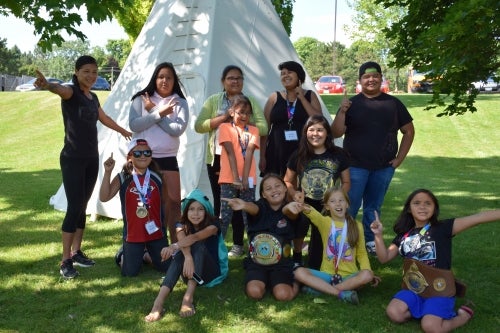Enrolment in Indigenous Studies Class Jumps by 400 Percent
The St. Paul's course in Indigenous studies ("Issues in Contemporary Native Communities") saw a whopping 400 percent increase in student enrolment for the winter term - something that may reflect a broader societal interest in Aboriginal culture and communities.
"A number of factors - such as the findings of the Truth and Reconciliation Commission and a growing presence of Aboriginal peoples in popular culture - are bringing to the forefront the idea that the general public lacks a deep understanding of Aboriginal culture and communities," said Principal Graham Brown. "We think students are keen to develop a greater knowledge of the issues in different communities and recognize that without this understanding, it will be hard for Canada to more forward in reconciliation.
Michael Doxstater from Six Nations Polytechnic taught the course; he holds a PhD in Education from Cornell University. St. Paul's sponsors the course and partners with Six Nations to appoint an Indigenous Visiting Professor to teach it. Enrolment in the course went from a typical 15 students, to 80.
Leading the Way
St. Paul's also recently started offering a unique course in Aboriginal Business Development (ENVS 400), designed to explore issues related to business development among, with, and within Indigenous communities.
Moreover, in consultation with Indigenous community partners, and the support of the President, Provost, and Deans of the University of Waterloo, St. Paul's leads the way in establishing an Aboriginal presence and strategy at the University through the Waterloo Aboriginal Education Centre (WAEC).
Responding to the Truth and Reconciliation Commission Report
Since the Truth and Reconciliation Commuission released ins 94 Calls to Action in June 2015, many communities and individuals have started exploring ways to respond to the Report's recommendations - and the UWaterloo creative and academic community is one of them.
To consolidate and communicate outreach, collaboration opporuniities, and developing research practices, the Waterloo Aboriginal Education Centre at St. Paul's and the Faculty of Arts are maintaining a website that will function as a hub for initiatives from across campus and Canada.
In addition, one of the biggest response projects on campus is scheduled for October 14-16: It's a three-day event called Integrating Knowledges: Truth & (Re)conciliation Project. This initiative promises an intercultural gathering of scholars, social justice advocates, elders, artists, cultural, and multidisciplinary practitioners, healers, intergenerational survivors, and students, among others. The objective of the summit is to generate creative and sustainable practices for reconciliation among Indigenous and non-Indigenous Canadians.
It is open to all, and will bring together a variety of on-and-off-campus partners.
Outreach Camps Continue to Bring in Youth
 The Waterloo Aboriginal Education Centre at St. Paul's continues to engage youth from Indigenous communities by offering different types of camps that fuse Indigenous cultural practices with an education component.
The Waterloo Aboriginal Education Centre at St. Paul's continues to engage youth from Indigenous communities by offering different types of camps that fuse Indigenous cultural practices with an education component.
For example, the Directions post-secondary awareness camp hosts high-school students from grades 9-12 (at different times) with a goal of introducing the value of post-secondary education and the STEM fields (Science, Technology, Engineering, Math). The Aboriginal Entrepreneurship Workshop focused on how business and Aboriginal cultures relate to one another. The Circle of Life-long Learning camp, sponsored by the Lyle S. Hallman Foundation, is aimed at younger students (grades 3-6) and their caregivers, again with the goal of introducing post-secondary education awareness at an even earlier stage. Finally a new camp will be piloted this summer: The Impact Girls' Summer Camp, focusing on girls in the STEM fields. Impact Girls is sponsored by the HeForShe initiative and the University's Impact 10x10x10 framework.







